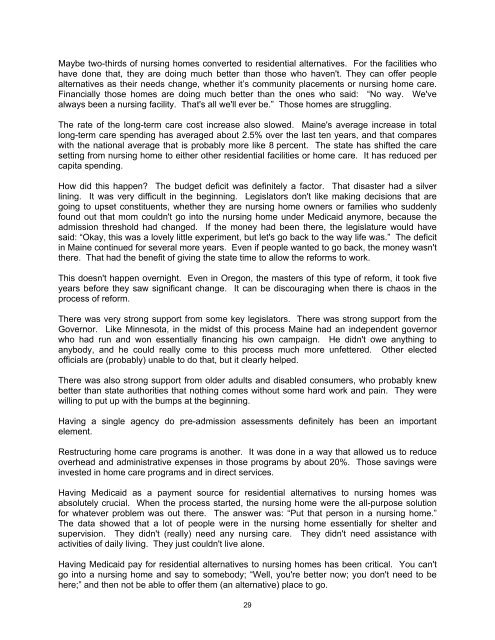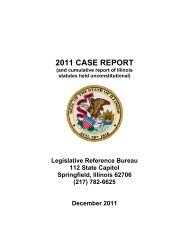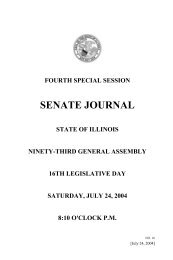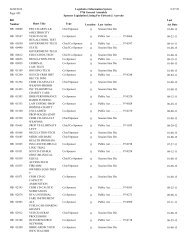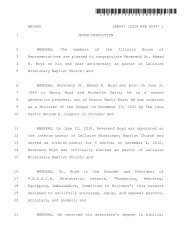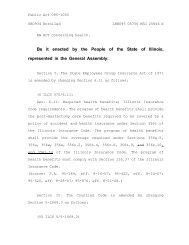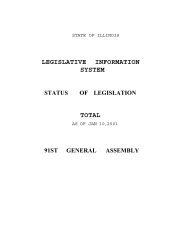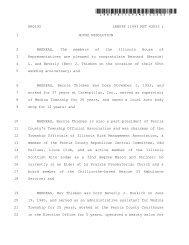Long-Term Care - Illinois General Assembly
Long-Term Care - Illinois General Assembly
Long-Term Care - Illinois General Assembly
Create successful ePaper yourself
Turn your PDF publications into a flip-book with our unique Google optimized e-Paper software.
Maybe two-thirds of nursing homes converted to residential alternatives. For the facilities who<br />
have done that, they are doing much better than those who haven't. They can offer people<br />
alternatives as their needs change, whether it’s community placements or nursing home care.<br />
Financially those homes are doing much better than the ones who said: “No way. We've<br />
always been a nursing facility. That's all we'll ever be.” Those homes are struggling.<br />
The rate of the long-term care cost increase also slowed. Maine's average increase in total<br />
long-term care spending has averaged about 2.5% over the last ten years, and that compares<br />
with the national average that is probably more like 8 percent. The state has shifted the care<br />
setting from nursing home to either other residential facilities or home care. It has reduced per<br />
capita spending.<br />
How did this happen? The budget deficit was definitely a factor. That disaster had a silver<br />
lining. It was very difficult in the beginning. Legislators don't like making decisions that are<br />
going to upset constituents, whether they are nursing home owners or families who suddenly<br />
found out that mom couldn't go into the nursing home under Medicaid anymore, because the<br />
admission threshold had changed. If the money had been there, the legislature would have<br />
said: “Okay, this was a lovely little experiment, but let's go back to the way life was.” The deficit<br />
in Maine continued for several more years. Even if people wanted to go back, the money wasn't<br />
there. That had the benefit of giving the state time to allow the reforms to work.<br />
This doesn't happen overnight. Even in Oregon, the masters of this type of reform, it took five<br />
years before they saw significant change. It can be discouraging when there is chaos in the<br />
process of reform.<br />
There was very strong support from some key legislators. There was strong support from the<br />
Governor. Like Minnesota, in the midst of this process Maine had an independent governor<br />
who had run and won essentially financing his own campaign. He didn't owe anything to<br />
anybody, and he could really come to this process much more unfettered. Other elected<br />
officials are (probably) unable to do that, but it clearly helped.<br />
There was also strong support from older adults and disabled consumers, who probably knew<br />
better than state authorities that nothing comes without some hard work and pain. They were<br />
willing to put up with the bumps at the beginning.<br />
Having a single agency do pre-admission assessments definitely has been an important<br />
element.<br />
Restructuring home care programs is another. It was done in a way that allowed us to reduce<br />
overhead and administrative expenses in those programs by about 20%. Those savings were<br />
invested in home care programs and in direct services.<br />
Having Medicaid as a payment source for residential alternatives to nursing homes was<br />
absolutely crucial. When the process started, the nursing home were the all-purpose solution<br />
for whatever problem was out there. The answer was: “Put that person in a nursing home.”<br />
The data showed that a lot of people were in the nursing home essentially for shelter and<br />
supervision. They didn't (really) need any nursing care. They didn't need assistance with<br />
activities of daily living. They just couldn't live alone.<br />
Having Medicaid pay for residential alternatives to nursing homes has been critical. You can't<br />
go into a nursing home and say to somebody; “Well, you're better now; you don't need to be<br />
here;” and then not be able to offer them (an alternative) place to go.<br />
29


